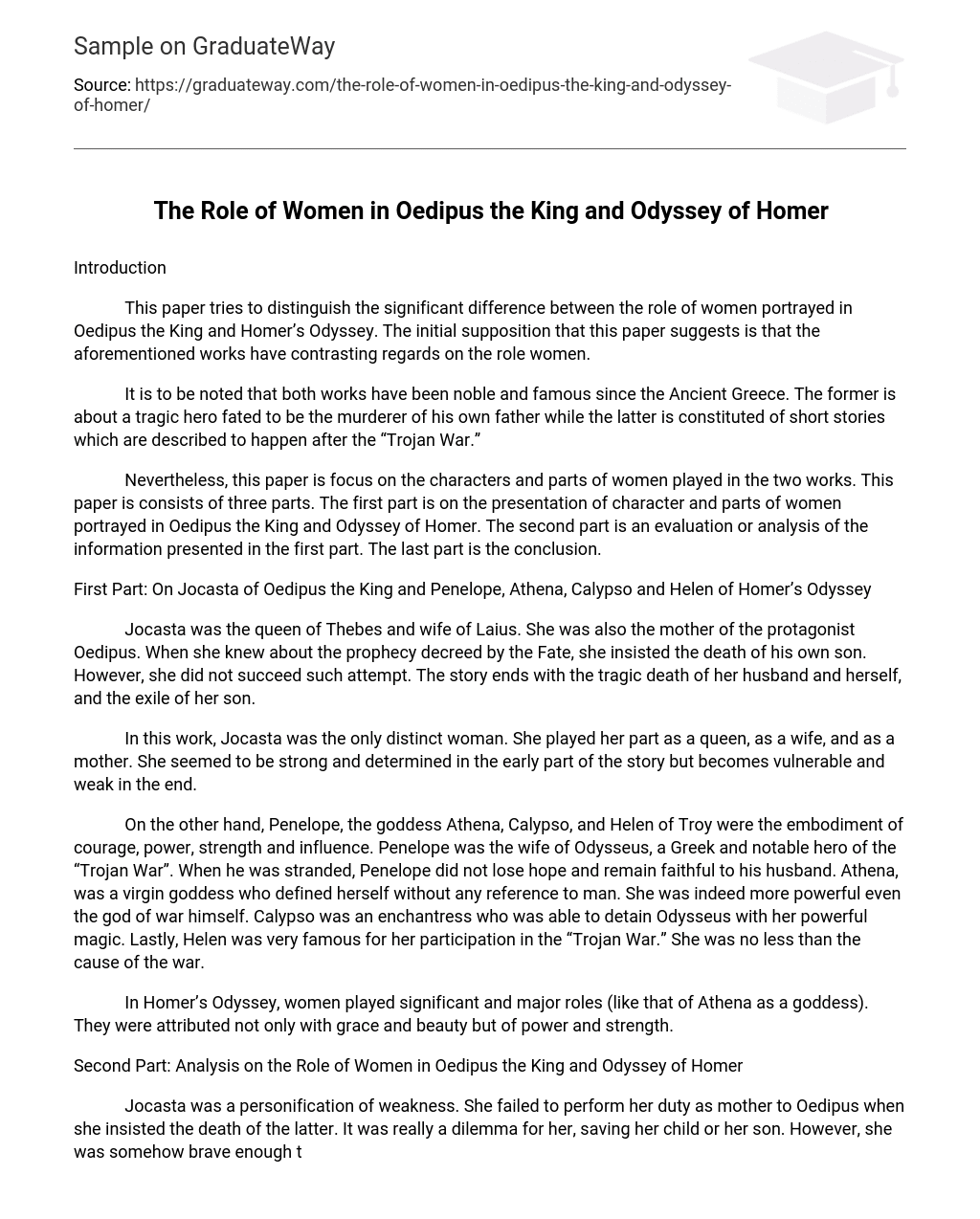Introduction
This paper tries to distinguish the significant difference between the role of women portrayed in Oedipus the King and Homer’s Odyssey. The initial supposition that this paper suggests is that the aforementioned works have contrasting regards on the role women.
It is to be noted that both works have been noble and famous since the Ancient Greece. The former is about a tragic hero fated to be the murderer of his own father while the latter is constituted of short stories which are described to happen after the “Trojan War.”
Nevertheless, this paper is focus on the characters and parts of women played in the two works. This paper is consists of three parts. The first part is on the presentation of character and parts of women portrayed in Oedipus the King and Odyssey of Homer. The second part is an evaluation or analysis of the information presented in the first part. The last part is the conclusion.
First Part: On Jocasta of Oedipus the King and Penelope, Athena, Calypso and Helen of Homer’s Odyssey
Jocasta was the queen of Thebes and wife of Laius. She was also the mother of the protagonist Oedipus. When she knew about the prophecy decreed by the Fate, she insisted the death of his own son. However, she did not succeed such attempt. The story ends with the tragic death of her husband and herself, and the exile of her son.
In this work, Jocasta was the only distinct woman. She played her part as a queen, as a wife, and as a mother. She seemed to be strong and determined in the early part of the story but becomes vulnerable and weak in the end.
On the other hand, Penelope, the goddess Athena, Calypso, and Helen of Troy were the embodiment of courage, power, strength and influence. Penelope was the wife of Odysseus, a Greek and notable hero of the “Trojan War”. When he was stranded, Penelope did not lose hope and remain faithful to his husband. Athena, was a virgin goddess who defined herself without any reference to man. She was indeed more powerful even the god of war himself. Calypso was an enchantress who was able to detain Odysseus with her powerful magic. Lastly, Helen was very famous for her participation in the “Trojan War.” She was no less than the cause of the war.
In Homer’s Odyssey, women played significant and major roles (like that of Athena as a goddess). They were attributed not only with grace and beauty but of power and strength.
Second Part: Analysis on the Role of Women in Oedipus the King and Odyssey of Homer
Jocasta was a personification of weakness. She failed to perform her duty as mother to Oedipus when she insisted the death of the latter. It was really a dilemma for her, saving her child or her son. However, she was somehow brave enough to defy the decree of the Fate. Yet, it only proved how wicked and feeble-minded she was when she failed to realize that her own son was the new King, and the murderer of her husband. When she found out the truth, she miserably committed suicide. Such personification was really unattractive throughout the whole story/play.
Jocasta, played a very antagonistic role. Her character signified impulsiveness, irrationality, and helplessness which were most commonly attributed to women by the patriarchal and sexist standpoint. This characterization given to Jocasta only strengthened the supposition that women were not good in decision-making.
Conversely, women in the Odyssey played very inspiring and empowering roles. Penelope showed the virtue of patience and fidelity to his husband. Athena expressed courage, purity and prudence. Calypso, though she was not really a good character in the Odyssey, embodied power and determination. Finally, Helen highlighted the fact that beauty was not really passive. It can either be used to build or destroy relationship.
The women of Homer’s Odyssey were encouraging women to stand up and join the race that was traditionally participated only by men. Their roles were portrayed as if they wanted to say on the face of the patriarchal society how significant they are. They seemed so iconic that even men would patronize and bend for them.
The contrasting characters played by women in Oedipus the King and Homer’s Odyssey were very considerable. It made the people learn that even during the Ancient civilizations, such as the ancient Greece, gender roles and gender issues were present. In addition, it made the people realize that women have strong and weak attributes. And through the examined works, role of women can vary according to how society and people regard them as well as how women themselves characterize themselves.
Third Part: Conclusion
Oedipus the King and Odyssey by Homer presented a very clear distinction on the roles of women during the ancient Greece. The former illustrated how women can be so weak and miserable. Nonetheless, the latter showed how women can be so powerful and strong.
The thesis statement that there is a contrasting regard on the role of women was supported by the comparison done on the two works. The two provided scenes and instances in their stories that which emphasized how women act, think and behave in various situations. To end, there were really contrasting elements that were presented in the two works that epitomized the characters and roles of women.
Reference:
Homer. (2003). The Odyssey (Revised edition ed.). (H. Rieu, Ed., & E. V. Rieu, Trans.) Penguin Classics.
Sophocles. (1998). Antigone, Oedipus the King, Electra (New Edition ed.). (E. Hall, Ed., & H. D. Kitto, Trans.) Oxford University Press.





